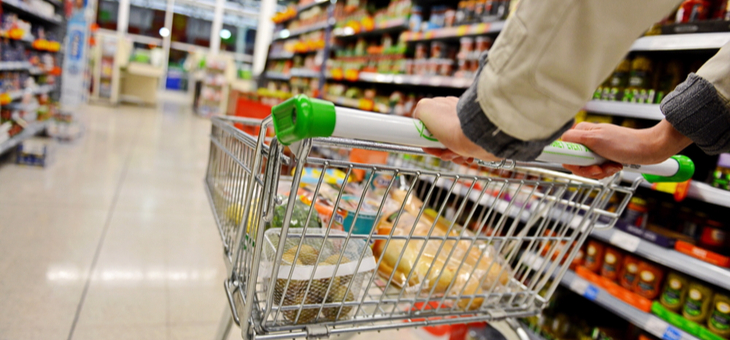The Government, manufacturers and retailers have been slammed, best and worst supermarkets named and food products ranked in the latest annual audit.
The report, FoodSwitch: The State of the Food Supply, was prepared by the George Institute for Global Health and Deakin University’s Global Obesity Centre and used the Government’s Health Star Rating (HSR) to rank more than 32,000 items on sale across Australia.
It classed almost half of those items as junk or ‘discretionary’ foods – those that are not a necessary part of a person’s diet.
Woolworths outranked its competition in the manufacturers’ own brand rankings with an average HSR of 3.2, followed by Coles (3.0), Aldi (2.7) and IGA (2.6).
The report said Aldi stocked the highest volume of ‘ultra-processed’ foodstuffs and that only 40 per cent of IGA’s own brand items were rated as healthy – that is, 3.5 stars and above.
The top five healthy manufacturers were A2 Dairy, Sanitarium, Nudie Foods, Simplot and Lion Dairy & Drinks. The bottom five were Peters Ice Cream (1.6 stars), Red Bull and Frucor Beverages (1.4 stars) and Mondelez and Bundaberg Brewed Drinks (1.2 stars).
The report aims to support Government, business and community efforts to help Australians choose healthier foods. Yet the challenge appears to be in making healthier products more readily available so consumers can make healthy choices.
“Some companies are improving the nutritional quality of their products, but more companies appear not to be making improvements,” the report says. “Between 2017 and 2018, the average HSR of product portfolios for the 33 largest manufacturers fell in 16 cases, and rose for only eight manufacturers.
“The absence of greater numbers of major food categories showing declines in sodium concentrations, for example, is disappointing, given sodium has been a focus of attention for health groups over recent years.
“Likewise, there is little evidence of reductions in sugar beyond chance …”
In a comparison of the 2017 and 2018 reports on supermarket home brand products, Woolworths rose from seventh to sixth and Coles from 13th to 11th, Aldi was static at 17th and IGA dropped from 12th to 19th.
Associate Professor Gary Sacks, from Deakin University, said: “We’re talking about differences in salt, saturated fat and sugar content. On average, if you were to buy home brand products from Woolworths, those products are likely to be quite a bit healthier than those from IGA.”
The biggest movers in the year-on-year comparison were Bega Cheese, which dropped from 15th to 24th, while Tru Blue Beverages and Unilever moved up six places.
“The fall in the ranking of Bega Cheese principally reflects its acquisition of the Vegemite and Zoosh brands, which score poorly because of high levels of salt, sugar and saturated fat,” the report says. “The decline in the ranking of IGA was due to more Black & Gold brand confectionery items on shelf in 2018 compared to 2017 and to fewer recorded fresh packaged fruit and vegetables products in their portfolio.”
While the report criticises the lack of improvement in the quality of the offerings, it says there are clear opportunities.
“Companies can renovate existing products by reformulating them to healthier compositions with reduced concentrations of sugars, salt, saturated fat or calories. Second, companies can change their ‘mix’ of products in their portfolio by deleting products that are unhealthy and introducing new ones with a better nutritional profile.
“Unsalted versus salted versions of canned vegetables, for example, often have sodium concentrations that are more than twenty-fold different. Leaving the salt out during manufacturing, and giving consumers the freedom to add salt if they wish would produce immediate and substantial improvements …”
The report puts the four major supermarkets on notice to improve their own brand products and make a difference.
And it puts the Government on notice to reset the rules regulating how foods are manufactured, marketed, sold and consumed.
Professor Bruce Neal, of The George Institute for Global Health, says Government action is urgently needed to improve the overall “healthiness” of the food supply given that about two in three Australian adults and one in four children are overweight or obese.
“We need the Government to take real action and focus their efforts on helping manufacturers and retailers to make our foods healthier,” he wrote in the report.
“Getting healthier foods on the shelves will be key to curbing the epidemic of obesity and diet-related ill health blighting Australia.
“Every day of inaction is putting the health of millions of Australians at risk.”
Do you opt for low or no-salt products? Do you check the sugar content? Will this report change your buying habits?
Related articles:
Do you have heart risk factors?
What alcohol does to brain and body
On the scent of a fix for dementia

